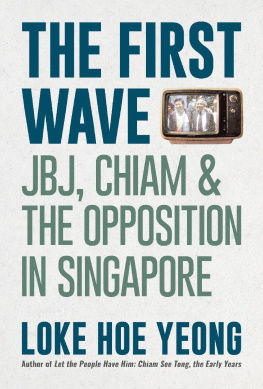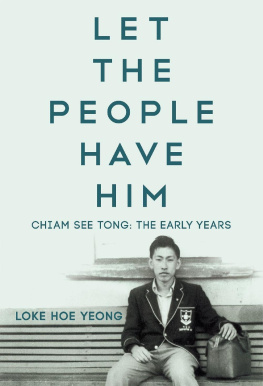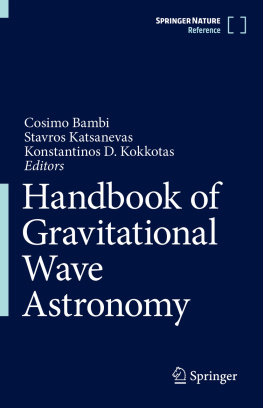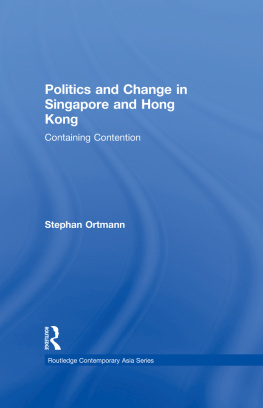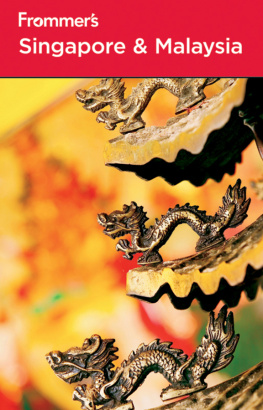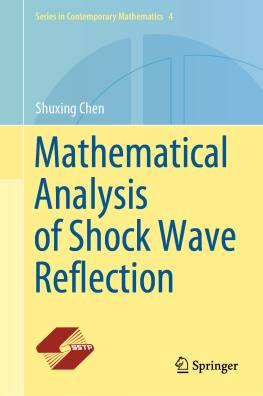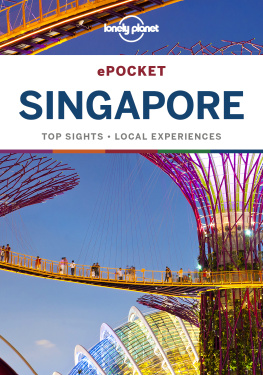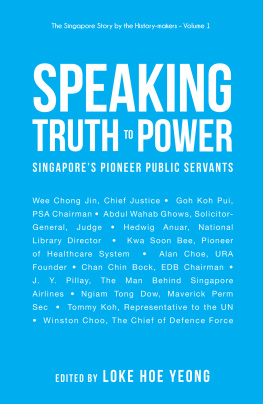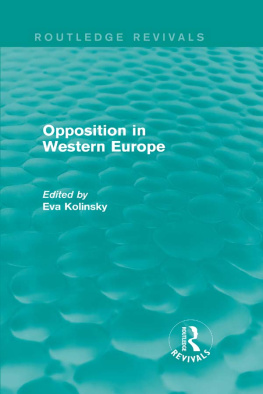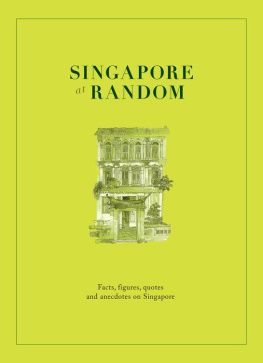Loke Hoe Yeong - The First Wave: JBJ, Chiam & the Opposition in Singapore
Here you can read online Loke Hoe Yeong - The First Wave: JBJ, Chiam & the Opposition in Singapore full text of the book (entire story) in english for free. Download pdf and epub, get meaning, cover and reviews about this ebook. year: 2019, publisher: Epigram Books, genre: Detective and thriller. Description of the work, (preface) as well as reviews are available. Best literature library LitArk.com created for fans of good reading and offers a wide selection of genres:
Romance novel
Science fiction
Adventure
Detective
Science
History
Home and family
Prose
Art
Politics
Computer
Non-fiction
Religion
Business
Children
Humor
Choose a favorite category and find really read worthwhile books. Enjoy immersion in the world of imagination, feel the emotions of the characters or learn something new for yourself, make an fascinating discovery.
- Book:The First Wave: JBJ, Chiam & the Opposition in Singapore
- Author:
- Publisher:Epigram Books
- Genre:
- Year:2019
- Rating:4 / 5
- Favourites:Add to favourites
- Your mark:
- 80
- 1
- 2
- 3
- 4
- 5
The First Wave: JBJ, Chiam & the Opposition in Singapore: summary, description and annotation
We offer to read an annotation, description, summary or preface (depends on what the author of the book "The First Wave: JBJ, Chiam & the Opposition in Singapore" wrote himself). If you haven't found the necessary information about the book — write in the comments, we will try to find it.
The First Wave: JBJ, Chiam & the Opposition in Singapore — read online for free the complete book (whole text) full work
Below is the text of the book, divided by pages. System saving the place of the last page read, allows you to conveniently read the book "The First Wave: JBJ, Chiam & the Opposition in Singapore" online for free, without having to search again every time where you left off. Put a bookmark, and you can go to the page where you finished reading at any time.
Font size:
Interval:
Bookmark:
ISBN: 978-981-48-4543-4
First Edition, July 2019
2019 by Loke Hoe Yeong
Author photo by Mindy Tan. Used with permission.
Cover photo and all other inside photos from Ministry of Information and the Arts, courtesy of National Archives of Singapore.
Cover design by Joanne Goh
Published in Singapore by Epigram Books
www.epigrambooks.sg
All rights reserved
Advance praise for The First Wave
Most commentators have commonly attributed the plight of the Republics Opposition parties to the PAP governments tactical and strategic finesse and its deliverance of a good life in modern and prosperous Singapore. However, the Oppositions shifting electoral tides and relatively weak performance are also due to other contributory factors. To these, one must include history, political culture, leadership, and extent of internal stability of the Opposition camp vis--vis the government...
Loke Hoe Yeongs reflections and acute grasp of the above political imperativeswhile also not casting aside other unpredictable imponderables in the Republics political landscapeplace this well-researched and well-articulated study a cut above many other writings about Singapores Opposition parties. Not intending to be a comprehensive project about Opposition parties and focusing more on the pivotal role played by J. B. Jeyaretnam and Chiam See Tong, this book contributes to our greater understanding of Singapores modern political history as a whole.
Professor Hussin Mutalib, PhD, author of Parties and Politics: A Study of Opposition Parties and the PAP in Singapore
To Eunjeong
All a poet can do today is warn.
That is why the true Poets must be truthful.
Wilfred Owen, draft Preface
Democratisation has been described to occur in waves, rather than as sudden bolts, as would be ascribed to political revolutions, for instance. The first wave of a democratic awakening in post-independence Singapore did start though with the bolt of J. B. Jeyaretnams surprise victory (or, for the Peoples Action Party [PAP], a shock defeat) in the Anson by-election of 1981. Only one general election before that in 1980, the ruling PAP was still looking at a share of 75.6 per cent of the popular vote with zero representation in Parliament from the opposition. Nevertheless, the momentum of opposition growth in Singapore built up gradually through to the 1984 general election, the first of many elections in Singapore to be called a watershed, in which Chiam See Tong was also elected in Potong Pasir. After the 1991 general election, and with a record four members in Parliament, the opposition began dreaming of forming the government one day.
But their euphoria was short-lived. After all, the use of the wave analogy also implies an element of ebb and flow. Almost immediately after the opposition victories of 1991, fault lines in the leading Singapore Democratic Party (SDP) rose to the surface, and the party was wiped out of Parliament in 1997. The opposition, as fronted by Chiam, spent the next decade thereafter experimenting with coalition arrangements among themselves.
But it was not until the 2011 general election that the Workers Party, led by its new leader, Low Thia Khiang, would more substantial gains for the opposition.
What went wrong with the first generation of Singapores post-independence opposition? This book examines their rise and fall in the period from 1981 to 2011, with the aim of filling a gap in explanations of Singapore politics.
Problematic explanations of Singapores politics
The old adage that oppositions dont win elections, governments lose them suggests incumbency is generally a liability for ruling parties. Although Singapore has always been known to be a sui generis case, there is a prevalence of muddled explanations as to why Singapore is that to such a great degree.
One school of thought favours the PAP and credits the longstanding ruling party of Singapore for winning the hearts and minds of the electorate with their policies, which have brought stability and prosperity, and chastises the opposition for failing to get its act together.
Meanwhile, the other school of thought sympathises with the opposition, and blames the PAP for the unfair hurdles and barriers erected against it, such as laws and regulations that restrict funding and the avenues of communication for opposition parties, and for creating a climate of fear that discourages more credible opposition candidates from stepping forward. Sometimes, the latter group admits that Singaporeans have been willing to sacrifice some political freedoms in return for political-economic stability.
Writing in 1995, the sociologist Chua Beng Huat asserted that it should be obvious that the refrain of authoritarianism as the explanation of Singapores political development in the past three decades is inadequate. His classic text, Communitarian Ideology and Democracy in Singapore , recognised a polarisation that has characterised studies on Asian governments, which either concentrates on a history of authoritarian repression or unequivocally praises the regime.
That situation remains unchanged in some quarters today. Outside of Singapore, observers and researchers from the media, academia and non-governmental organisations tend to be aligned with the latter group. This resonates with the democracy indices by organisations like Freedom House and the Economist Intelligence Unit, which generally rank Singapore far down the list, setting it apart from its peers in the club of advanced economies.
To be clear, this is not to be an apologist for repressive laws, just as it is inconceivable for Chua to be one. Important as they are, those critiques of the Singapore system belong to a different debate. In fixating themselves on Singapores restrictions on political freedoms and civil liberties, these observers miss the opportunity to offer rigorous explanations on why things have turned out the way they do.
The question is whether their analyses stand the test. Witness how in the aftermath of the 2011 general election, for instance, some scholars of democratisation expounded on the way opposition parties were finding new energy and backing, as young people flock to social media to express themselves more openly, and how the PAP appeared to be entering a more vulnerable phase which would accelerate when the founding generation of leaders, particularly Lee Kuan Yewpasses from the sceneonly to be proven completely wrong on all counts at the 2015 general election. To be fair, by most accounts, the PAP were surprised at their own strong showing that year.
On the other hand, there have been scholars who have theorised Malaysia as one of the Southeast Asian authoritarian regimes where democratisation by elections is highly unlikely to happen because their elections are deemed to be so flawedonly to be found scrambling for explanations and qualifications when the opposition Pakatan Harapan alliance won the 2018 Malaysian general election.
To put things in an international context, these misguided analyses were comparable to the abject failure of many leading experts and observers to foresee the results of the 2016 Brexit referendum in the United Kingdom or the presidential election in the United States that same year, because of their misreading of the overall ground sentiments.
Also, some of these observers have waded into the debate between the moderate opposition and the confrontational opposition in Singapore, one key theme in this book. The frequent criticism they make of the opposition in Singaporeparticularly of Chiam See Tong and Low Thia Khiangis that they are not radical enough, and are not offering a differentiated choice for voters vis--vis the PAP; ergo, they have failed to make greater inroads into Parliament or induce substantive political change. Their observations may be valid insofar as it is a reflection of how powerfully the PAP government has shaped the national narrative of what kind of politics is desirable for Singapore. But they ignore the fact that there is at least one tradition of opposition politics in the West which says that an Opposition must oppose but not obstruct, it must be constructive, not disruptive. Those observers also do not address a strategic dilemma facing the opposition in Singapore, to which the political scientist Hussin Mutalib has alludedif too confrontational, the opposition would lose a considerable swathe of generally contented, middle-ground voters; if too moderate, the PAPs technocratic superiority would beat them to it where policy prescriptions are concerned.
Font size:
Interval:
Bookmark:
Similar books «The First Wave: JBJ, Chiam & the Opposition in Singapore»
Look at similar books to The First Wave: JBJ, Chiam & the Opposition in Singapore. We have selected literature similar in name and meaning in the hope of providing readers with more options to find new, interesting, not yet read works.
Discussion, reviews of the book The First Wave: JBJ, Chiam & the Opposition in Singapore and just readers' own opinions. Leave your comments, write what you think about the work, its meaning or the main characters. Specify what exactly you liked and what you didn't like, and why you think so.

